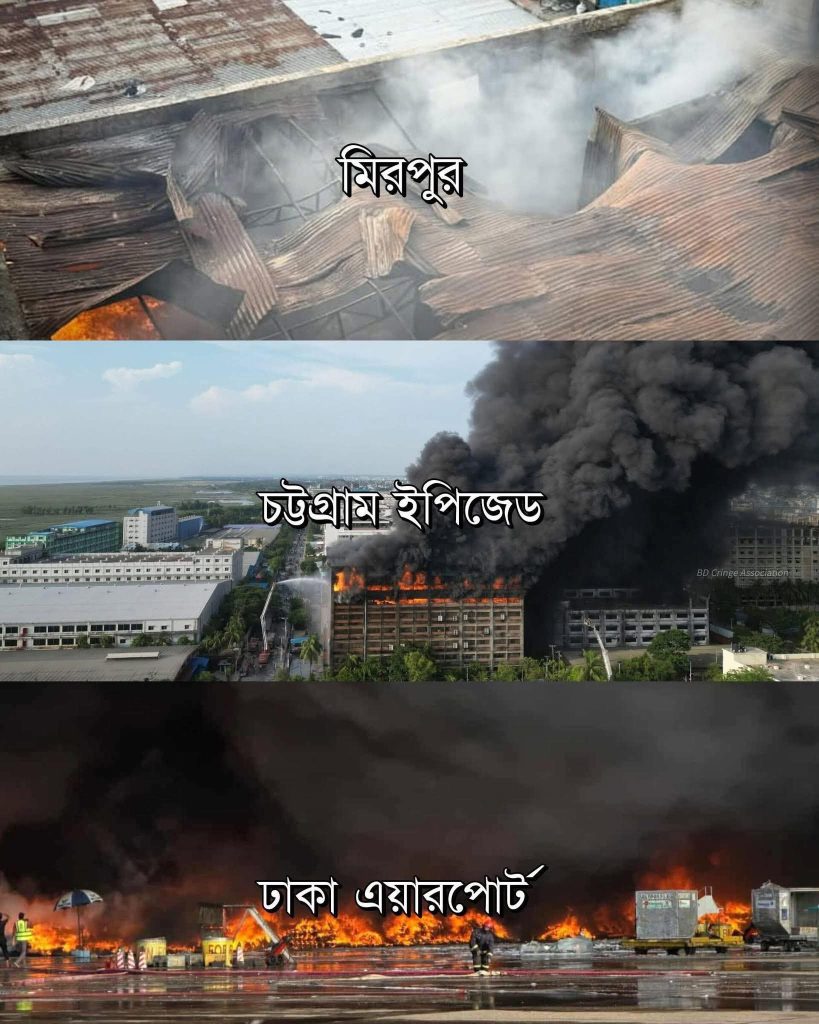A sudden surge in fires across the country has raised alarm. Incidents at critical sites, including garment factories, airports, government offices, warehouses, and shopping complexes, have sparked public panic. The mysterious origins of several blazes have prompted questions: are these accidents, or is there orchestrated sabotage at play?
Experts suggest that neither accident nor sabotage can be ruled out at this stage. They stress the urgent need for thorough investigations to determine the true causes. Some allege that the interim Yunus government is deliberately undermining the nation’s economy through a calculated strategy.
On October 18, a major fire erupted at the Cargo Village of Hazrat Shahjalal International Airport in the capital. It took over six hours to bring it under control, leading to a temporary suspension of all flights at this key international hub. Goods worth crores of taka, including food, medical equipment, electronic components, and industrial raw materials, were destroyed in the blaze at the airport’s Import Village, which began shortly after noon.
Fire service units responded promptly, but experts note that the fire’s source and rapid spread suggest it was not a typical accident. The power supply was cut before the blaze, and unusual behaviour by security personnel has further fuelled suspicions.
Bangladesh GDP 1.81% in first quarter of FY26—lowest in four years
Yunus to hand over Chittagong Port to US-linked DP World in December
Onshore Gas Exploration: US tightens grip in Bangladesh amid geopolitical tension
Recent weeks have seen relentless fires in Mirpur, Chittagong EPZ, Narayanganj, and now Shahjalal Airport. Given the strategic importance of these locations, some suspect a coordinated conspiracy against the state, potentially backed by the Yunus government, to destabilise Bangladesh’s economy and administration. These incidents are inflating commodity prices and sowing despair.

On Thursday, a devastating fire razed the seven-storey “Adams Cap and Textile Limited” factory in Chittagong’s CEPZ, reducing it to rubble.
On Tuesday, around 11:30am, a blaze at the Shah Alam Chemical Godown in Rupnagar Industrial Area, Dhaka, claimed 16 garment workers’ lives, with several others reportedly missing.
On October 13, seven workers were injured in a fire at a battery lead factory in Narsingdi’s Panchdona area, some critically, and are receiving treatment at the National Burn Institute.
Earlier, on September 22, five people, including four fire service members, died in a blaze at a chemical godown in Tongi’s Sahara Market.
Fires, both large and small, continue to plague key establishments and populated areas, raising concerns about whether these are mere accidents or part of a deliberate plot.
A case has been filed against Shah Alam, owner of a chemical warehouse, and its manager, following the deaths of 16 people in a fire at Shialbari, Mirpur, on Tuesday. The blaze, which began around 11:30am at Alam Traders, spread to a four-storey building housing Smart Printing and RN Fashion factories, where 16 bodies were later recovered. The accused have been absconding since the incident, with charges of negligent death filed by the victim’s family.
What The Experts Say
Syed Sultan Uddin Mahmud, Executive Director of the Bangladesh Institute of Labor Studies (BILS), told the Bangla Tribune: “Only intelligence agencies can definitively investigate sabotage. However, widespread negligence in chemical safety is evident, as these incidents demonstrate.”
Yunus’ Misrule: Bangladesh grapples with inflation, unemployment
Prices of vegetables, fish, eggs going beyond people’s reach
NBR Protests: Vengeful actions against officials by Yunus regime continue
He added: “We cannot dismiss sabotage given the frequency of these fires. Our regard for human safety, particularly for workers and residents, is alarmingly low. Chemical safety systems are mismanaged, and regular inspections are inadequately enforced. Without legal reforms and accountability, such tragedies will persist.”
Major (Retd) AKM Shakil Newaz, former director at the Fire Service and Civil Defence, told the Bangla Tribune: “Neither accident nor sabotage can be dismissed. Fires are occurring every few days in critical locations like EPZ, airports, and Mirpur. These sites should have advanced firefighting systems, yet they’ve proven ineffective. Why did fire teams fail to act swiftly?”
He questioned the response of the airport’s nearby fire stations and suggested investigating potential disputes or financial motives, given the high-value goods involved.
Bangladesh Economy: 20 years of achievements evaporated in one year
Financial Times at odds after paid documentary on Bangladesh’s missing billions
Bangladesh’s Crisis Deepens in 2025: A Nation in Decline
On Saturday evening, Commerce and Civil Aviation Adviser Sheikh Bashir Uddin visited the airport fire site, announcing the formation of a committee to investigate the cause and prioritise resuming flights. The interim government, in a statement from the Chief Advisor’s Press Wing, acknowledged public concern and confirmed that security agencies are thoroughly investigating each incident. It vowed “immediate and firm action” if evidence of sabotage or arson is found, emphasising efforts to protect lives and property.
Questions Surrounding Yunus’ Silence
The government’s apparent silence amid these disasters is troubling. Administrative inaction, delayed investigations, and media-driven confusion fuel speculation. Political analysts suggest the Yunus government may be undermining national stability to portray Bangladesh as a failing state internationally. Is this inaction tacit support for the perpetrators?
Economic Sabotage
The airport fire directly threatens the import sector, jeopardising food, medicine, and garment industry supplies. This risks supply chain disruptions and artificial inflation, described by economists as a form of economic terrorism aimed at crippling the nation.
Analysts urge the nation to set aside political divisions and unite against this destructive force. “This fire doesn’t just burn warehouses; it threatens the nation’s future,” one commented. Bangladesh has overcome conspiracies before and must do so again through collective resistance.